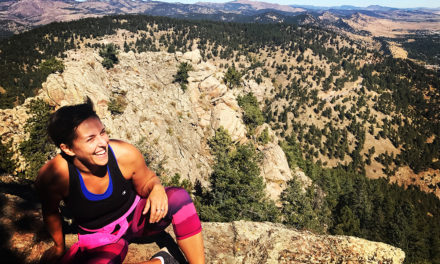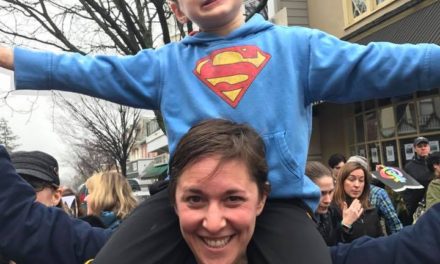Around 4 o’ clock on most weekday afternoons, teens from Trenton and nearby suburbs and towns stream into a renovated factory on South Clinton Avenue. They’re met by a collection of interesting objects filling the vacuous space. In the middle of the floor are mats stacked neatly like pancakes and well-ordered boxes of rings, balls, pins, bizarre hats, oversized shoes, and clown noses. Above them are endless ribbons of thick silk fabric strung from the ceiling and pooling on the floor. There are a dozen unicycles leaning against one wall and racks of colorful costumes hanging lifelessly from the hangers in an adjacent room, all biding their time until school lets out.
Lying dormant in this massive space, which was once part of the historic Roebling Wire Factory, are all the makings of a circus, waiting patiently for young limbs and minds to breathe life into them.
The teens are here for their afterschool training at the Trenton Circus Squad. Girls and boys with afros and ponytails stride into the sun-dipped former factory in leggings and ripped skinny jeans, plaid button-downs tied around their waists, headphones around their necks, and cell phones in their back pockets. They’re animated—this isn’t something they have to do. They want to be here.
That’s because the Trenton Circus Squad is a special place. Dreamt up and founded by Executive Director Zoe Brookes and Program Director Tom von Oehsen, the nonprofit brings together teens aged 12 to 18 from around the region to train, perform, and teach workshops related to circus arts. The year-round program, currently training about 40 teens, is designed to empower low-income and at-risk Trenton youths, but it also breaks barriers between urban and suburban kids who may not have had the opportunity to interact.
When they arrive, the teens ditch their school bags in cubbies and head for the fridge, which is stocked with snacks, before their lead coach, Liam Quat, gives them the rundown. They know they will be practicing on the beam, working on their juggling technique, spotting each other on the high wire, or fine-tuning their pyramid configurations. What they may not be as acutely aware of is the life skills—teamwork, problem-solving, self-confidence, commitment, and endurance—they’ll procure along the way.
“Our program is about using circus arts to achieve some other kind of social end, not just for the fun of juggling,” Brookes says. “Sometimes it’s rehabilitative; sometimes it’s about building community. In our case, it’s about helping kids develop the skills they need to be competent adults who give back to society, and bridging the divide between Trenton and surrounding towns.”
“Without an adult to tell you exactly how to do stuff, young people are always having ideas, running into obstacles, and then figuring out a way around it,” Brookes says. “Sometimes it’s problem solving—how are we going to get this person on stage on time? How are we going to get this person onto a trapeze when they don’t have the strength to lift themselves? In the problem-solving, they always have to work together.”
Circus in Town
Zoe Brookes, 49, didn’t start out anywhere near the circus. Born and raised in South-ampton in Southern England, she attended London Business School, moved to New Haven, Conn., with her husband, Alastair, in 1999, and did strategic planning work for Bain & Company and then Deloitte & Touche. But after 4 years in the business world and 3 kids—Iona, Gus, and Calum—Brookes found herself drawn to a local circus.
 “We came upon this community circus in New Haven when my children were very young,” Brookes recalls. “There was just a puppeteer, a musician, a clown, and a storyteller, but Iona, who was 6 years old at the time, was completely fascinated.” So Brookes got involved with the circus and began performing in the shows. The kids joined too, with Iona excelling at aerials and the silks while Gus became a ringmaster and acrobat. It wasn’t long before Brookes took on a leadership role, and the circus became one of the three rings of her family’s social life.
“We came upon this community circus in New Haven when my children were very young,” Brookes recalls. “There was just a puppeteer, a musician, a clown, and a storyteller, but Iona, who was 6 years old at the time, was completely fascinated.” So Brookes got involved with the circus and began performing in the shows. The kids joined too, with Iona excelling at aerials and the silks while Gus became a ringmaster and acrobat. It wasn’t long before Brookes took on a leadership role, and the circus became one of the three rings of her family’s social life.
But in 2008, her husband, Alastair, was transferred to the Bristol-Myers Squibb headquarters in New Jersey, and Brookes had to switch gears. “The day we told the kids, Iona was a bit horrified,” Brookes says. “She was quiet for about 10 minutes, and then she said, ‘I guess we’ll have to start a circus in New Jersey.’” And that’s just what they did.
Brookes created a DIY nonprofit circus called Stone Soup on a shoestring budget. While she wasn’t in it to make money, she also didn’t want to exhaust her family’s resources. So, a bit like the folktale of Stone Soup, she asked neighbors and community members to share what they had. And she got creative, including making “juggling balls with balloons and rice.” After growing Stone Soup Circus over the next few years, Brookes eventually developed a partnership with Craig Quat, who ran Circus Place in Hillsborough, N.J., that got even more kids involved. “We started putting on full-length shows every June with 50 or 60 kids at Pettoranello Gardens in Princeton,” says Brookes.
In 2012, Brookes sold Stone Soup Circus to Craig Quat, deciding she was ready to recommit herself to strategic planning work for nonprofits, and she began working with ISLES, a nonprofit organization based in Trenton. But as she drove from Princeton into Trenton each day, she couldn’t stop thinking about the life skills circus arts had brought to the children she’d worked with over the years, and how much kids in Trenton would benefit from that.
With prompting from friends, she reached out to Tom von Oehsen, admission director at Princeton Academy of the Sacred Heart, who ran a summer circus program focused on clowning. Each of their individual ideas and philosophies fit so perfectly together that Brookes and von Oehsen decided to become partners in the venture—she would take on much of the fundraising and strategic planning aspects, and he would direct the programming. “In the fall of 2014, we decided if we could raise $100,000, Tom would quit his job and take on the Trenton Circus Squad full-time, so that was the challenge. And we did that by Christmas,” Brookes says.
They used the money Brookes received from the sale of Stone Soup Circus and support from the James E. and Diane W. Burke Foundation to get things started. Plus, recalls Brookes, “Between January and June 2015, we did everything we could to get people to give us money. We created our Founders’ Ring of 12 donors, and got nine more people who all gave at least $5,000. Then another hundred or so people came in with whatever they could afford. That gave us enough funding for our first year.”
Off and Running
The City of Trenton had rented the Roebling Wire Factory to von Oehsen during the summer for his Clown Academy, and as Brookes and von Oehsen solidified their concept for the Trenton Circus Squad, they went back to Trenton to see if they could have the space year-round. The city agreed, giving them a 5-year lease on the space. “The nice thing about it is that the city can still continue to run the community events, like Art All Night and the Punk Rock Flea Market,” Brookes says. “We have an agreement with the city that includes us moving our stuff for the weekends when they need it.”
After some minor renovations to the former factory space, Trenton Circus Squad began to operate in earnest in July 2015. With coaches and trainers in place led by Natasha Shatzkin, the programming squared away by von Oehsen, and the business plan enacted by Brookes, the program was a juggling act—but a successful one. Each 12-week session, the Trenton Circus Squad began training about 40 kids from Trenton and the suburbs. And they were off and running—teaching circus arts to young people, running workshops, and regularly performing local shows.
 But the “success” was also defined by other metrics. “There’s such a need as kids start to move away from being under their family’s control, and experiment and test their limit—and they need a place to go,” Brookes says. “If you can make it a safe place to experiment with their bodies and minds, then you can help them avoid some of the less appealing options, like gangs, for example.
But the “success” was also defined by other metrics. “There’s such a need as kids start to move away from being under their family’s control, and experiment and test their limit—and they need a place to go,” Brookes says. “If you can make it a safe place to experiment with their bodies and minds, then you can help them avoid some of the less appealing options, like gangs, for example.
“Kids just show up in very different ways, but all of them, over time, come to trust that this is a place where they won’t be judged, where they’re safe, where they can go at their own pace.”
Trenton Circus Squad is now in its second full year, and on any given weekday around 4 p.m., you can walk in and see the juggling pins and balls, the silks, the unicycles, and young people over the age of 12 in their full kinetic glory. Teens will be practicing walking on stilts and high wires, and swinging from trapezes. They’ll be balancing and bending and lifting and spinning—and helping their peers do the same. They will also be learning to trust others, pushing beyond their comfort zones, and comprehending, sometimes for the first time, what they are capable of achieving.
And that’s just a regular day at the circus.








